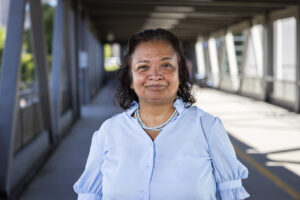
Dr. Sengupta is a clinical professor and the vice chairs of Philanthropy & Inclusive Excellence & Community Engagement in the Department of Neurology. Born in Kolkata, India, and raised in England, UK. Dr. Sengupta earned her medical degree and Ph.D. at the University of Cambridge, UK, and her MBA and healthcare graduate certification from the Carl H. Lindner College of Business, Cincinnati, OH.
Why this career path and why did you choose to work at UNC?
I have built a career in neuro-oncology as a board-certified Neurologist and Neuro-oncologist, and I am also fellowship-trained in Integrative Medicine. I have a deep commitment to brain and spine cancer patients and their families. I have been part of “Head to the Hill” events for the American Academy of Neurology and the National Brain Tumor Society. I am also involved in the American Brain Tumor Association. I chose UNC since I wanted to work with a diverse population of patients in a system that prides itself on patients first, no matter where they are socioeconomically.
Did you go to college/graduate school with the intention of getting the job you have now? If not, explain how you came to the position you’re in now at the university. Any other jobs lead you here?
I went to school with the intention of doing what I am doing now. However, with my leadership training, most recently as an executive leadership in healthcare fellow (Drexel University), I aspire to continue to utilize my skills in healthcare leadership, to further improve patient access and care.
What was your college/graduate experience been like in general?
I am a lifelong learner. I was fortunate to have many exceptional mentors at the University of Cambridge. One in particular, Professor Gordon Wright, a World War II veteran, provided me with a love of neuroanatomy, which evolved into a passion for research in the neurosciences. I worked in several laboratories at Cambridge, including Professor Paul Lehner’s laboratory, developing a strong interest in immunology and membrane proteins. My Ph.D. involved working in two countries (England and France), and I was able to be multi-lingual, understanding the cultures of different countries. Growing up in the UK and spending time in France, I understood what it was to be “different” and an “outsider.”
Were you a first generation or low-income college student? If so, what was that like for you? (For example: Did your family encourage getting a higher degree? Did you always feel like you would be able to get into or “make it” in college? Did you have a good support system in college? How did you overcome any obstacles that may have prevented your from obtaining a Ph.D.?)
There were periods through my father’s transitions in the healthcare profession, in the UK, and in Zambia, where finances were an issue, and I learned to be able to do with less. I grew up in an environment where I was not discouraged from pursuing my academic interests. I was fortunate that I had a scholarship from the Medical Research Council, UK, for my Ph.D., I was also funded by foundations to do my research in France. As for hardships, I stayed within a limited budget and shared accommodation. In France, I experienced housing for “foreigners and people of color” at the University of Strasbourg, and this was an eye-opener.
Do you have any advice about the college/medical school/postgraduate/ neurology experience that you would offer to students who intend to go to graduate school in order to obtain a doctorate degree/other career path?
Follow your ambitions and dreams, and the rest will fall into place. Always put your patient first, and your patient is your greatest teacher. Never neglect your family and your friends.
What elements of DEI are most important to you and your career?
Having grown up in the UK and Zambia during my formative years, I was able to thrive on rich cultural experiences. The diversity and richness of cultures and countercultures are of significant interest. As a Southeast Asian female child, I came across a lot of restrictions and prejudices in what I could or could not do, and equity and inclusion became essential to me. Having gone to boarding school in England as a young child, traveling independently from Zambia to the UK, I learned independence of thought and how to navigate cultures and people very early on. In my work, I am a co-leader of DEI in one of the cancer clinical trial cooperative groups; this is very important to me as clinical trials are traditionally an area where many injustices have occurred in unethical human research. Practicing inclusivity is an integral part of my being, and as Maya Angelou stated, “In diversity, there is beauty, and there is strength.”
